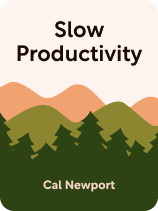

This article is an excerpt from the Shortform book guide to "Slow Productivity" by Cal Newport. Shortform has the world's best summaries and analyses of books you should be reading.
Like this article? Sign up for a free trial here.
Are you feeling overwhelmed by constant busyness at work? Is there a better way to approach productivity?
In Slow Productivity, Cal Newport challenges traditional notions of productivity. He proposes a new approach that emphasizes quality over quantity, focusing on meaningful outcomes rather than visible activity.
Keep reading to discover how Newport’s principles of slow productivity can transform your work life.
Overview of Slow Productivity (Cal Newport)
In Slow Productivity, Cal Newport argues that visible busyness does not equal high productivity. He explains that this outdated belief is a holdover from the Industrial Revolution and unsuited to today’s knowledge-based work culture.
According to Newport, this type of “pseudo-productivity” emphasizes constant activity at the expense of significant progress toward meaningful goals. He argues that as knowledge work becomes more common, there’s a pressing need for a new definition of productivity that prioritizes outcomes and deep focus over busyness.
Newport is a computer science professor at Georgetown University and founding member of the Center for Digital Ethics. Newport’s work, including books such as Deep Work, Digital Minimalism, and A World Without Email, challenges readers to rethink their relationship with digital tools, advocating for more intentional and effective uses of technology. Newport is also a contributing writer for The New Yorker and the host of the Deep Questions podcast.
In this overview of Slow Productivity (2024), we’ll explain why Newport argues traditional definitions of productivity are flawed, and why he thinks “slow productivity” is an effective and sustainable model that will increase your professional success and improve your work-life balance. We’ll introduce Newport’s key principles of slow productivity and provide practical strategies for how to implement them in your personal and professional life.
The Problem With Productivity as We Know It
According to Newport, traditional productivity hinges on the idea that more visible activity equals greater productivity—the more you’re seen doing (like rapidly replying to emails or attending meetings), the more productive you are. Newport argues that this is an outdated understanding of productivity, which stems from a period in history when physical labor dominated the workforce: During the Industrial Revolution, it was logical to measure a person’s productivity by their tangible outputs (for example, the number of widgets completed).
However, Newport writes, as more jobs became knowledge-based roles filled by thinkers and planners who produce ideas and strategies rather than physical goods, the metrics for productivity failed to evolve. The absence of clear success indicators for knowledge work led organizations to continue to depend on visible busyness as evidence of productivity.
Newport criticizes the traditional measurement of productivity, which he terms “pseudo-productivity.” In equating busyness with effectiveness, this approach disregards actual achievement. It pressures individuals to appear constantly busy, leading to burnout and a lack of progress toward important goals. Newport argues that productivity should be redefined from merely completing a high volume of tasks to achieving high-quality, meaningful results.
An Alternative: Slow Productivity
Instead of the typical fast-paced work environment, Newport advocates slow productivity—doing fewer things at a natural pace, with a greater focus on quality. Newport’s vision of a more sustainable way to work borrows from time-tested practices of traditional knowledge workers like writers, artists, and scientists.
For example, naturalist Charles Darwin exemplified slow productivity in his scientific endeavors. Rather than rushing through experiments and publications, Darwin took over 20 years to meticulously gather data, conduct experiments, and refine his theories before publishing On the Origin of Species. This deliberate and unhurried approach allowed him to produce a highly impactful and groundbreaking work that has stood the test of time.
Newport argues that slow productivity can help modern workers feel less overwhelmed. This approach challenges the norm that values speed and quantity over quality. Instead, Newport suggests that consistent, meaningful effort leads to real productivity. His goal is to offer practical advice for a better workflow and to change how we view productivity, emphasizing sustainability without lowering ambition.
We’ll outline the three key principles of slow productivity: doing less, working at your own pace, and prioritizing quality over quantity. While Newport acknowledges that these principles were initially designed for freelancers and those with greater job autonomy, he argues they can also help people in more structured roles.
Principle 1: Do Less
The first principle of slow productivity is to do less. Newport argues that, to truly excel and foster both creativity and quality in your work, you need to do fewer things. This principle challenges the common belief that being busier leads to greater accomplishments. Instead, Newport advocates dedicating your time, energy, and focus to a select few tasks that matter the most. By focusing on fewer tasks, you improve your concentration and are more likely to achieve better results.
Newport writes that doing less allows you to channel your resources more efficiently toward activities that genuinely contribute to your goals and personal fulfillment. Also, you can avoid the pitfalls of lower-quality work and burnout by embracing the idea of doing less.
Newport says that every major project you take on comes with a cascade of smaller tasks, from emails to meetings, and all of them continue to eat away at your focus and time. Therefore, to successfully start doing less, you must take on fewer big projects.
Focus on Fewer Big Projects
Step one of doing less: Cut down on the big stuff. This means choosing a few important projects or goals to focus on and not overloading your plate with too many big commitments. Keep it simple so you can give those tasks your full attention. Newport provides the example of mathematician Andrew Wiles, who spent years focusing solely on proving Fermat’s Last Theorem (a number theory that had stumped mathematicians for centuries), ultimately achieving a groundbreaking result due to his concentrated effort.
To ensure that you only take on what you have the capacity for, Newport suggests you establish a clear system for deciding whether you’ll take a project on and, if so, when it’ll be done—the aim is clarity about when things can realistically get started based on what else is happening.
Streamline Your Smaller Tasks
Once you have fewer projects to focus on, the next step is to streamline the smaller tasks that come with those big projects. Newport suggests the following strategies: First, automate routine activities to save time. For example, setting up email filters and auto-responses can help you manage and prioritize your inbox efficiently. Additionally, you can create more space in your schedule by investing in tools like project management software to organize and track your tasks or outsourcing lower-level tasks whenever possible.
Be Strategic About What You Take On
Newport emphasizes that not all small tasks are equally important. He suggests having two lists—one where new ideas or tasks go (“Holding Tank”) and one for things you’re working on now (“Active List”). This way, instead of jumping to another task every time something new comes up, you can assess your current load and decide when—or if—you can tackle something new.
Putting these strategies into practice helps control the chaos by ensuring you handle both large goals and daily responsibilities more effectively, allowing you to be less busy but more productive.
Principle 2: Work At Your Own Speed
Newport’s second principle of slow productivity emphasizes working at a natural and sustainable pace. This approach, more similar to a pre-industrial rhythm of work and rest, recognizes that meaningful achievements take time and can’t be sustained through nonstop activity. According to Newport, working at a pace that respects your individual needs and natural rhythms produces more significant and meaningful results.
To implement this principle, Newport suggest several strategies.
Keep It Simple
Don’t jam-pack your day with tasks. This helps keep stress at bay and makes sure you’re not overwhelmed by a never-ending to-do list. For example, if you usually list 15 tasks for the day, try limiting it to the top five priorities.
Give Yourself More Time
Don’t rush. Newport says you should allocate more time than necessary to complete a task or project. This way, you can dive deeper into your work without feeling rushed. For instance, if you estimate a report will take three days, schedule it over five days to allow thorough research and revisions.
Take Breaks With the Seasons
Newport recommends that just as farmers rest in winter, you should plan times during the year when you’ll slow down, rest, and reflect. He explains that it’s natural to have ups and downs in productivity; these downtimes are important because they can help refill your creative tank. For example, you might choose to designate summer months for lighter projects and personal development, reserving intense work for other times of the year.
Make Your Workspace Yours
Newport says that your environment should help you focus, not distract you with clutter or discomfort. Whether it’s pictures that inspire you or a certain type of music that gets your ideas flowing, customize your workspace to encourage focus and creativity.
Create Meaningful Routines
Start rituals around your work habits—maybe lighting a candle before brainstorming sessions or taking three deep breaths before tackling emails—to signal to yourself that it’s time to concentrate deeply or think creatively.
Principle 3: Do Your Best Work
The third principle is to commit to producing quality work. This becomes easier when you take on less and work at a natural pace. Newport recommends investing your time and, if necessary, your money into making sure what you do is the best it can be. Why is focusing on quality so important? For starters, it encourages you to slow down—because doing something well takes time—and makes this intentional pace not just acceptable but necessary. Consider the care and attention you’d want to give a project that truly matters to you; naturally, you’d want to take the extra time needed to refine and perfect it. This mindset not only leads to better outcomes but also makes the process more rewarding.
Here are Newport’s tips for prioritizing quality in everything you do:
Develop an Appreciation for Excellence
Newport also advocates seeking out examples of excellence in other fields. Whether through exploring influential books, engaging with art, or studying leading figures in your area of interest, knowing greatness when you see it helps elevate your work.
Devote Focused Time to Tasks
Dedicate focused time toward honing your craft or project, says Newport. This might mean setting aside specific times when you can focus without interruptions—times when others might not demand your attention.
Adjust Financial Goals
If possible, Newport says to adjust your financial goals and lifestyle to prioritize producing high-quality work over making quick money. This means focusing on long-term satisfaction and meaningful outputs rather than immediate financial gains. For example, instead of taking on many low-paying, high-stress projects to earn quick cash, choose fewer, higher-quality projects that pay well over time. This approach helps you maintain a sustainable workload and deliver better results while achieving financial stability.
Set Public Goals
Newport says that announcing deadlines adds a layer of accountability through external expectations; knowing people are waiting on the outcome can make you more motivated to produce high-quality work.
Embrace Constructive Criticism
Engaging with a community that holds high standards can inspire you and provide you with valuable feedback on how to improve. Newport says that seeking out and responding to feedback can help you refine your work and push your skills to new levels.

———End of Preview———
Like what you just read? Read the rest of the world's best book summary and analysis of Cal Newport's "Slow Productivity" at Shortform.
Here's what you'll find in our full Slow Productivity summary:
- The flaws with the traditional definitions of productivity
- The principles of Cal Newport’s “slow productivity”
- Why doing less actually means you’re doing more






